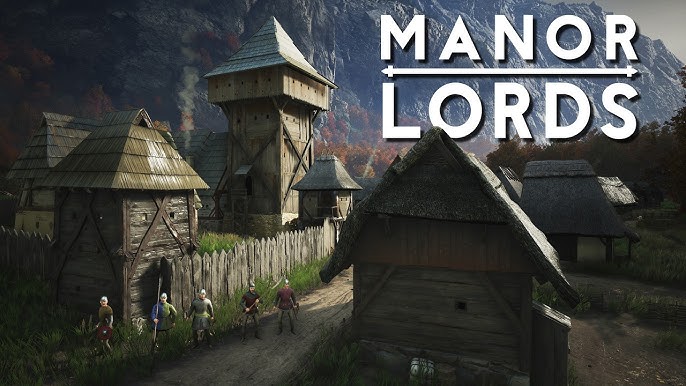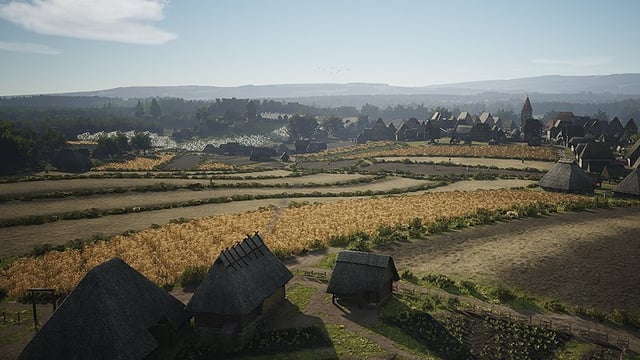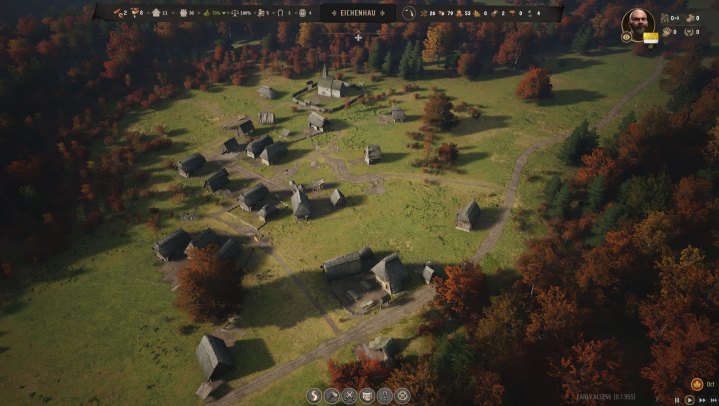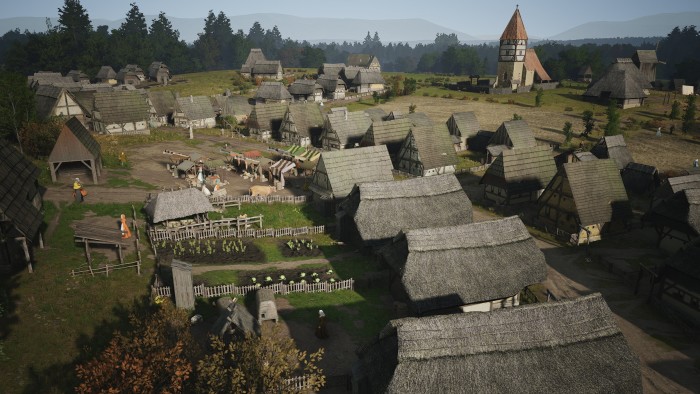Manor Lords Review: Is This Medieval City-Builder Worth the Early Access Plunge?

Manor Lords has garnered significant attention for its ambition: a blend of intricate city-building mechanics with Total War-inspired tactical combat, all wrapped in a historically plausible medieval setting. As a seasoned PC gaming veteran, I’ve spent over 20 hours meticulously crafting settlements, managing unruly villagers, and leading retinues into battle in this Early Access title. The question is, does Manor Lords live up to the hype, or does its pursuit of realism ultimately lead to a repetitive and unfulfilling experience? Let's delve into the core mechanics, dissect the economic system, analyze the combat integration, scrutinize the optimization, and gauge the overall community reception to determine if Manor Lords is a worthy addition to your PC gaming library.
Gameplay Loop and Tedium: Does the Grind Outweigh the Glory?
The initial hours of Manor Lords are undeniably captivating. The process of transforming a virgin landscape into a thriving medieval village is genuinely rewarding. You begin by assigning families to build basic structures like hunter's huts and forager camps, slowly establishing a supply of food and resources. The tile-by-tile expansion of territory feels organic, and the visual detail of your settlement, with its individual villagers going about their daily lives, is impressive.
However, as your settlement grows, the constant need for micro-management becomes increasingly apparent. Production chains, while initially engaging, quickly devolve into a series of repetitive tasks. You're constantly adjusting production limits, ensuring sufficient resources are allocated, and manually assigning families to different tasks. The lack of robust automation or delegation options exacerbates this issue. While the game allows you to set production priorities, it lacks the smart, adaptive AI needed to handle fluctuations in demand or resource availability.
After 20+ hours, the initial charm begins to fade, replaced by a sense of unfulfilling routine. The absence of a clearly defined "end-game" or late-game progression further contributes to this feeling of stagnation. Unlike Cities: Skylines, which offers a wealth of late-game infrastructure projects and city-wide planning challenges, Manor Lords lacks that sense of continuous progression. Once you've established a stable economy and a decent-sized army, there's little incentive to continue expanding, beyond simply increasing your population and accumulating more resources.
Ultimately, the gameplay loop in Manor Lords struggles to maintain long-term engagement. While the initial hours are compelling, the repetitive micro-management and lack of late-game goals ultimately lead to a feeling of stagnation, a problem that Cities: Skylines, with its expansive options, manages to avoid.
Economic System Depth: Medieval Realism or Simplistic Simulation?
Manor Lords prides itself on its realistic depiction of medieval resource management. The game features a wide array of resources, from basic necessities like food and firewood to more specialized goods like ale, clothing, and weapons. The simulation of seasonal cycles, with crops growing in the spring and summer and requiring storage for the winter, adds a layer of complexity to the economic system.

However, despite its ambition, the economic system in Manor Lords often feels oversimplified. While the game simulates supply and demand to some extent, it lacks the nuance and depth of a truly realistic economic model. For example, regional specialization is limited, and the game doesn't fully capture the complexities of medieval trade routes. While you can establish trade agreements with neighboring regions, the system lacks the strategic depth of influencing market prices or establishing trade monopolies.
Compared to the intricate, node-based systems in Cities: Skylines, the economic model in Manor Lords feels somewhat rudimentary. While Cities: Skylines allows for granular control over every aspect of your city's economy, Manor Lords takes a more hands-off approach. This can be both a strength and a weakness. On one hand, it makes the game more accessible to newcomers. On the other hand, it limits the strategic options available to experienced players.
Ultimately, while Manor Lords's economic system offers a decent representation of medieval resource management, it falls short of providing the strategic depth and complexity that many players crave. It's a step above the relatively simpler systems of other city-builders, but it still has room for improvement.
Combat Integration: Seamless Synergy or Disjointed Mini-Game?
One of the defining features of Manor Lords is its integration of Total War-style tactical combat with city-building elements. The game allows you to raise retinues from your population, equip them with weapons and armor, and lead them into battle against bandits, rival lords, or invading armies.

However, the integration of combat feels somewhat disjointed. While battles are certainly impactful, influencing the control of territory and the security of your resources, they often feel like a separate mini-game rather than a natural extension of managing your settlements. The transition from city-building to tactical combat can be jarring, and the two aspects of the game don't always feel seamlessly connected.
The AI in Manor Lords is competent but not particularly intelligent. It will generally attempt to flank your units or exploit weaknesses in your formation, but it lacks the strategic acumen of a human opponent. The player has decent control over troop formations, tactics, and unit abilities, but the combat system lacks the depth and complexity of a dedicated strategy game like Total War. While you can utilize terrain features and strategic formations to gain an advantage, battles often come down to simply outnumbering the enemy.
Moreover, the frequency of bandit raids can become tiresome. While defending against these raids is initially engaging, it quickly becomes a repetitive chore, further disrupting the flow of city-building.
In conclusion, while the combat in Manor Lords is a welcome addition to the city-building genre, its integration feels somewhat underdeveloped. It adds a layer of strategic depth to the game, but it doesn't fully realize its potential.
Optimization and Performance: Can Your PC Handle the Medieval Life?
Optimization and performance are critical factors in any Early Access release, and Manor Lords is no exception. Many players have reported performance issues, particularly on lower-end systems. Let's analyze the game's performance on various PC hardware configurations:
- (1) Intel Core i5-8400 with an NVIDIA GeForce GTX 1060: On this configuration, players can expect to achieve average frame rates of 30-40 FPS at 1080p with medium settings. To maintain a stable 60 FPS, it's necessary to lower shadow quality, draw distance, and particle effects.
- (2) AMD Ryzen 5 3600 with an AMD Radeon RX 5700: This system performs better, achieving 45-60 FPS at 1080p with high settings. Some tweaking of graphical settings may still be required to maintain a consistent 60 FPS during large battles.
- (3) Intel Core i7-12700K with an NVIDIA GeForce RTX 3070: On this high-end configuration, Manor Lords runs smoothly at 60+ FPS at 1440p with high settings. 4K gaming is possible, but frame rates may dip below 60 FPS during intense action sequences, even with tweaked settings.
Anecdotal evidence from the Steam forums suggests that CPU utilization is often high, even on powerful systems, which can lead to stuttering and frame rate drops. Many players have reported that reducing the population density and limiting the number of active production chains can improve performance.
The minimal hardware required to consistently achieve 60 FPS at 1080p with medium settings is likely an Intel Core i5-9400 or AMD Ryzen 5 2600 paired with an NVIDIA GeForce GTX 1660 or AMD Radeon RX 580. For 1440p with high settings, an Intel Core i7-10700K or AMD Ryzen 7 3700X with an NVIDIA GeForce RTX 2070 or AMD Radeon RX 5700 XT would be recommended. 4K gaming at ultra settings would require a top-of-the-line configuration, such as an Intel Core i9-13900K or AMD Ryzen 9 7950X with an NVIDIA GeForce RTX 4080 or AMD Radeon RX 7900 XTX.

Overall, Manor Lords suffers from optimization issues that can impact the gameplay experience, especially on lower-end systems. While the game is visually impressive, its high CPU utilization and demanding graphical requirements require further optimization to ensure a smooth and enjoyable experience for all players.
Community Reception: What Are Players Saying About Manor Lords?
The Steam forums and user reviews offer valuable insights into the community's perception of Manor Lords. During the first two weeks of its Early Access launch (April 26th - May 10th, 2024), the game received a mixed reception, with both positive and negative feedback themes emerging.
Common positive feedback themes include:
- Visual fidelity and historical accuracy: Many players praised the game's stunning visuals and its attention to detail in recreating medieval life.
- Innovative city-building mechanics: The tile-by-tile expansion system and the focus on individual villagers were also well-received.
- Tactical combat: Players enjoyed the Total War-style battles, although some felt that they could be further refined.
Examples of positive user reviews:
- "This game is absolutely beautiful! The city-building is incredibly satisfying, and the battles are intense and engaging."
- "I love the attention to detail in this game. It really feels like you're building a real medieval town."
However, several recurring criticisms also emerged:
- Performance issues: Many players reported experiencing performance problems, particularly on lower-end systems.
- Repetitive micro-management: The constant need to manually manage villagers and production chains was a common source of frustration.
- Lack of late-game content: The absence of a clearly defined end-game or late-game progression was also a major concern.
- Clarity of economic indicators: Some players found it difficult to understand the economic system and to identify the root causes of economic problems.
Examples of negative user reviews:
- "This game has potential, but the performance is terrible. I'm constantly getting frame rate drops, even on a high-end system."
- "The micro-management in this game is insane. I'm spending more time clicking on individual villagers than actually building my town."
- "There's nothing to do after you build a decent-sized town. The game just becomes a repetitive grind."
Recurring issues such as the pace of progression, the challenge of managing villagers, and the overall polish of the Early Access build were also frequently mentioned in the Steam forums.

In summary, the community reception to Manor Lords has been mixed, with players praising its visuals, historical accuracy, and innovative city-building mechanics while also criticizing its performance issues, repetitive micro-management, and lack of late-game content.
Verdict: A Promising Start, But Room for Improvement
Manor Lords represents a promising direction for the city-builder and grand strategy genres on PC. Its realistic take on medieval city-building and warfare is refreshing, and its visual fidelity is truly impressive. However, the game is still in Early Access, and it suffers from several significant issues that need to be addressed.
The repetitive micro-management, the lack of late-game goals, and the optimization problems all detract from the overall experience. While the combat system is a welcome addition, its integration feels somewhat underdeveloped.

Does Manor Lords live up to the hype? Not entirely. However, it has the potential to become a truly exceptional game. With further optimization, improved automation, and the addition of more late-game content, Manor Lords could well be on its way to becoming one of the best city-builders on PC.
For now, I'd recommend approaching Manor Lords with cautious optimism. If you're a fan of city-builders and grand strategy games, and you're willing to tolerate some rough edges, then it may be worth taking the Early Access plunge. However, if you're looking for a polished and complete experience, you may want to wait until the game is further along in development.
Consider wishlisting Manor Lords on Steam to keep up to date with development!